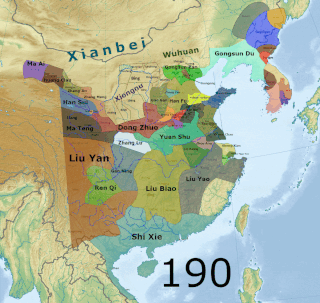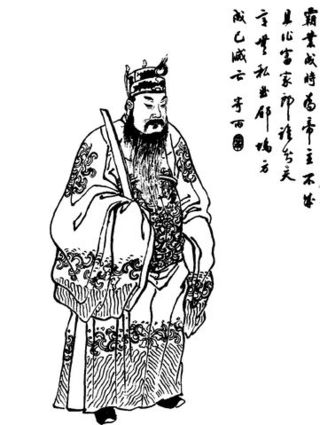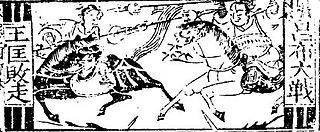
The 2nd century is the period from AD 101 through AD 200 (CC) in accordance with the Julian calendar. It is considered part of the Classical era, epoch, or historical period.
The 190s decade ran from January 1, 190, to December 31, 199.

The Three Kingdoms of Cao Wei, Shu Han, and Eastern Wu dominated China from 220 to 280 AD following the end of the Han dynasty. This period was preceded by the Eastern Han dynasty and followed by the Western Jin dynasty. Academically, the periodisation begins with the establishment of Cao Wei in 220 and ends with the conquest of Wu by Jin in 280. The period immediately preceding the Three Kingdoms, from 184 to 220, was marked by chaotic infighting among warlords across China as Han authority collapsed. The period from 220 to 263 was marked by a comparatively stable arrangement between Cao Wei, Shu Han, and Eastern Wu. This stability broke down with the conquest of Shu by Wei in 263, followed by the usurpation of Cao Wei by Jin in 266 and ultimately the conquest of Wu by Jin in 280.
Year 190 (CXC) was a common year starting on Thursday of the Julian calendar. At the time, it was known as the Year of the Consulship of Aurelius and Sura. The denomination 190 for this year has been used since the early medieval period, when the Anno Domini calendar era became the prevalent method in Europe for naming years.
Year 192 (CXCII) was a leap year starting on Saturday of the Julian calendar. At the time, it was known as the Year of the Consulship of Aelius and Pertinax. The denomination 192 for this year has been used since the early medieval period, when the Anno Domini calendar era became the prevalent method for Europeans for naming years.

Sun Jian (155–191?), courtesy name Wentai, was a Chinese military general, politician, and warlord who lived during the late Eastern Han dynasty of China. He allied himself with Yuan Shu in 190 when warlords from eastern China formed a coalition to oust Dong Zhuo, a tyrannical warlord who held the puppet Emperor Xian in his power. Although he controlled neither many troops nor much land, Sun Jian's personal bravery and resourcefulness were feared by Dong Zhuo, who placed him among Yuan Shao, Yuan Shu and Liu Biao as the most influential men at that time. After the coalition disbanded in the next year, China fell into civil war. In 191, Sun Jian was killed in battle during an offensive campaign against Liu Biao.

Emperor Xian of Han, personal name Liu Xie (劉協), courtesy name Bohe, was the 14th and last emperor of the Eastern Han dynasty in China. He reigned from 28 September 189 until 11 December 220.

Dong Zhuo, courtesy name Zhongying, was a Chinese military general, politician, and warlord who lived in the late Eastern Han dynasty. At the end of the reign of the Eastern Han, Dong Zhuo was a general and powerful minister of the imperial government. Originally from Liang Province, Dong Zhuo seized control of the imperial capital Luoyang in 189 when it entered a state of turmoil following the death of Emperor Ling of Han and a massacre of the eunuch faction by the court officials led by General-in-Chief He Jin.

Yuan Shao, courtesy name Benchu (本初), was a Chinese military general, politician, and warlord who lived in the late Eastern Han dynasty. He occupied the northern territories of China during the civil wars that occurred towards the end of the Han dynasty. He was also an elder half-brother of Yuan Shu, a warlord who controlled the Huai River region, though the two were not on good terms with each other.

Ding Yuan, courtesy name Jianyang, was a Chinese politician and warlord who lived during the late Eastern Han dynasty of China. In 189, both he and Dong Zhuo were summoned into the capital Luoyang with their individual troops to assist in the struggle against the powerful eunuch faction. However, Ding Yuan was eventually killed by his trusted aide Lü Bu, who had been bought over by Dong Zhuo.
Zhu Jun, courtesy name Gongwei, was a military general and official who lived during the Eastern Han dynasty of China.
Dong Cheng was a Chinese military general who lived during the late Eastern Han dynasty of China. He was also the father of Lady Dong, a concubine of Emperor Xian.

The end of the Han dynasty was the period of Chinese history from 189 to 220 CE, roughly coinciding with the tumultuous reign of the Han dynasty's last ruler, Emperor Xian. It was followed by the Three Kingdoms era. During the end of the Han dynasty, the country was thrown into turmoil by the Yellow Turban Rebellion (184–205). Meanwhile, the Han Empire's institutions were destroyed by the warlord Dong Zhuo and fractured into regional regimes ruled by various warlords, some of whom were nobles and officials of the Han imperial court. The warlord Cao Cao took control of Emperor Xian and his court in 196 and began gradually reunifying the empire. Cao Cao ostensibly operated under Emperor Xian's rule, though in reality the emperor was a hostage.
Qiao Mao, courtesy name Yuanwei, was an official and minor warlord who lived during the late Eastern Han dynasty of China. In 190, he joined a coalition of warlords who launched a campaign against Dong Zhuo, a tyrannical warlord who controlled the Han central government and held Emperor Xian hostage. Later that year, he was killed after getting into a dispute with Liu Dai, one of the other warlords.

Wang Kuang, courtesy name Gongjie, was a government official and minor warlord who lived during the late Eastern Han dynasty of China.

The Campaign against Dong Zhuo was a punitive expedition initiated by a coalition of regional officials and warlords against the warlord Dong Zhuo in 190 in the late Eastern Han dynasty. The members of the coalition claimed that Dong had the intention of usurping the throne by holding Emperor Xian hostage and by establishing a strong influence in the imperial court. They justified their campaign as to remove Dong from power. The campaign led to the evacuation of the capital Luoyang and the shifting of the imperial court to Chang'an. It was a prelude to the end of the Han dynasty and, subsequently, the Three Kingdoms period.
The Battle of Yangcheng was fought between the warlords Yuan Shao and Yuan Shu as the coalition against Dong Zhuo fell apart in 191 in the late Eastern Han dynasty. Sun Jian, Yuan Shu's nominal subordinate returning from his triumphant capture of the abandoned capital of Luoyang, became involved in Yuan Shao and Yuan Shu's personal feud as the former allies turned against one another. Yuan Shao's forces, under Zhou Yu, first got the upper hand against Sun Jian's forces, but were beaten back by Sun's counterattack.
Zhang Wen, courtesy name Boshen, was a Chinese official and military general of the Eastern Han dynasty. Zhang held prime ministerial office during the reign of Emperor Ling of Han, serving as Grand Excellency of Works from 184 to 185 and Grand Commandant from 186 to 187. Zhang oversaw the dynasty's military response to the Liang Province Rebellion from 185 to 186, supervising the future warlords Dong Zhuo and Sun Jian. After Dong seized control of the Eastern Han court in 189 and relocated it from Luoyang to Chang'an, Zhang continued to serve in ministerial office while conspiring against Dong. He was executed in November 191 at Dong's order.
Chen Ji, courtesy name Yuanfang, was an official and scholar who lived during the Eastern Han dynasty of China.

The Battle of Chang'an, also known as the Sack of Chang'an, took place in the western Chinese imperial capital city of Chang'an on 28 June 192, at the end of the Han dynasty, the prelude of the Three Kingdoms.










